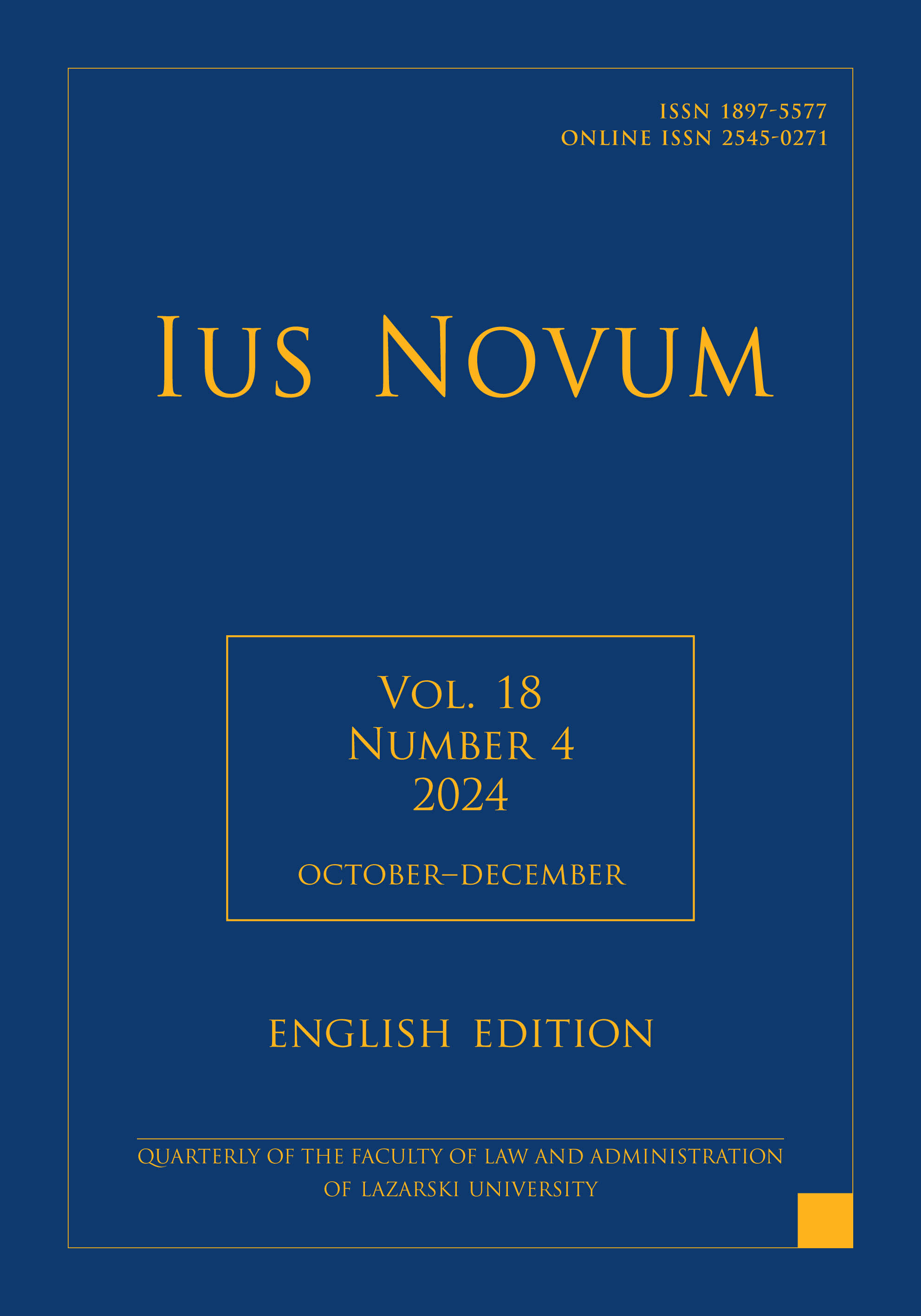Abstract
This article is scientific and research-oriented, analysing the right, granted by the Act of 26 July 2024,1 which amends certain acts to improve the functioning of the Armed Forces of the Republic of Poland, the Police, and the Border Guard in the event of a threat to state security. The right concerns a request for the appointment of public counsel for the defence by a soldier, a police officer, or a Border Guard officer accused of a crime committed as a result of the use of direct coercive measures, weapons, or other armaments, or the application or use of coercive measures or firearms in connection with the performance of specific official activities or tasks (Article 78a of the Code of Criminal Procedure). The article also examines the broader possibilities of providing financial support to soldiers for covering the costs of legal assistance incurred in cases concerning crimes committed in connection with the performance of official tasks and activities (Article 296(5) and Article 316(5) of the Act on the Defence of the Homeland). Additionally, provisions authorising the reimbursement of legal assistance costs to officers of certain other services are analysed. The main scientific objective is to assess the justification for introducing these amendments to criminal procedure law, as well as existing solutions that privilege soldiers and officers of certain services in terms of access to counsel for the defence. The main research theses aim to demonstrate that these changes result in a violation of the principle of equality before the law. The results of the study are original, as they highlight the need for legislative intervention. The study holds significant value for both academia, as it offers a dogmatic analysis and substantial theoretical insights, and for practical application, as it suggests directions for interpretating the criteria for applying the new provisions, potentially contributing to their uniform application.
References
Dąb, A., Cincio, K., ‘Prawo do obrony’, in: Zagadnienia prawne Konstytucji PRL, Vol. III, Warszawa, 1954.
Cieślak, M., Polska procedura karna. Podstawowe założenia teoretyczne, Warszawa, 1971.
Jastrzębski, W., Wnorowski, K., ‘Status żołnierzy terytorialnej służby wojskowej w świetle polskiego prawa karnego materialnego i procesowego’, Wojskowy Przegląd Prawniczy, 2023, No. 1.
Kalinowski, S., Postępowanie karne. Zarys części ogólnej, Warszawa, 1963.
Kardas, A., Kardas, P., ‘Zasada równości w prawie karnym (zarys problematyki)’, Czasopismo Prawa Karnego i Nauk Penalnych, 2019, No. 1.
Koncewicz, T.T., Podolska, A., ‘Dostęp do adwokata w postępowaniu karnym. O standardach i kontekście europejskim’, Palestra, 2017, No. 9.
Krempeć, E., in: Królikowski, H. (ed.), Obrona Ojczyzny, Warszawa, 2023.
Kruszyński, P., Stanowisko prawne obrońcy w procesie karanym, Białystok, 1991.
Kruszyński, P., in: Bieńkowska, B., Kruszyński, P. (ed.), Kulesza, C., Piszczek, P., Pawelec, P., Wykład prawa karnego procesowego, Białystok, 2003.
Mik, B., ‘O potrzebie dodatkowego, szczególnego unormowania odpowiedzialności odszkodowawczej Skarbu Państwa za niesłuszne skazanie oraz niewątpliwie niesłuszne oskarżenie, przedstawienie zarzutów lub zastosowanie nieizolacyjnego środka zapobiegawczego’, Prokuratura i Prawo, 2012, No. 12.
Musolf, G., in: Melezini, A., Teszner, K. (eds), Ustawa o Krajowej Administracji Skarbowej. Komentarz, Warszawa, 2024.
Murzynowski, A., Istota i zasady procesu karnego, Warszawa, 1976.
Murzynowski, A., ‘Glosa do wyroku SN z dnia 8 kwietnia 2002 r., V KKN 281/00’, Orzecznictwo Sądów Polskich, 2002, No. 12.
Stefański, R.A., Obrona obligatoryjna w polskim procesie karnym, Warszawa, 2012.
Stefański, R.A., ‘Odpowiedzialność za niesłuszne skazanie, niewątpliwie niesłuszne oskarżenie, przedstawienie zarzutów lub zastosowanie nieizolacyjnego środka zapobiegawczego’, Prokuratura i Prawo, 2012, No. 12.
Tuleja, P., in: Tuleja, P. (ed.), Konstytucja Rzeczypospolitej Polskiej. Komentarz, Warszawa, 2023.
Wiliński, P., Zasada prawa do obrony w polskim procesie karnym, Kraków, 2006.
Zieliński, M., Wykładnia prawa. Zasady, reguły, wskazówki, Warszawa, 2010.

This work is licensed under a Creative Commons Attribution-NonCommercial-ShareAlike 4.0 International License.
Copyright (c) 2024 Lazarski University, Warsaw, Poland

